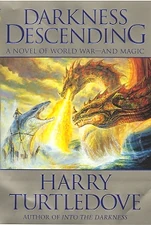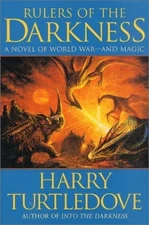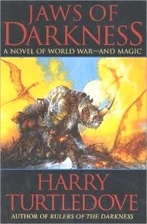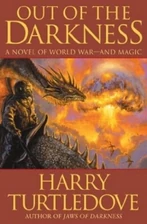| Hajjaj | |
| Fictional Character | |
| Darkness Fantasy< | |
| Appearance(s): | Into the Darkness through Out of the Darkness |
| Type of Appearance: | Direct POV |
| Nationality: | Zuwayza |
| Occupation: | Foreign minister |
| Spouse: | Kolthoum, Hassila, Lalla |
| Children: | Jamila |
Hajjaj was the foreign minister of Zuwayza during the Derlavaian War, and generally considered one of the most skillful diplomats of his generation. That Zuwayza emerged from the war as an independent kingdom, rather than being reconquered by Unkerlant, was in no small measure due to Hajjaj's skill.
As a young man, Hajjaj studied in Trapani, the capital of Algarve. He remained fond of Algarvian culture throughout his life, preferring it to that of his country's oppressive neighbor, Unkerlant.
At the onset of his involvement in public affairs, Hajjaj had a central role in using the Twinkings War, a civil war raging in Unkerlant, to regain Zuwayza's independence. Thereafter, he loyally served the Kings of Zuwayza as a diplomat, with his primary goal being the preservation of that independence.
For his part, the young and inexperienced King Shazli gave Hajjaj a free hand in running the country's foreign policy, though Hajjaj was punctilious in showing the King every respect and always keeping him informed. Hajjaj was also on good terms with the commanders of the Zuwayzi Army, and well-able to coordinate with them on the many occasions when diplomacy and military action needed to support each other.
At the outset of what became the Derlavain War, Unkerlant attacked Zuwayza while Algarve battled its own neighbors. While the Zuwayzin initially did well, they were eventually overwhelmed, prompting Hajjaj to travel to Cottbus, the Unkerlanter capital. Hajjaj stood up to King Swemmel of Unkerlant as few people dared to do. He got terms which, while tough (Zuwayza lost quite a bit of territory), still preserved his country's independence.
Thereafter, he built up a secret alliance with Algarve, bolstered by his personal friendship with the Algarvian Ambassador Marquis Balastro.
In the attack on Unkerlant which Zuwayza launched in conjunction with Algarve, Zuwayza did well. With the Unkerlanter capital directly threatened, Unkerlant could not spare resources to the less essential northern front, and could not stop the Zuwayzans from regaining the territory they lost and a bit beside. The Zuwayzans were not greedy, however - capturing only territory inhabited by their black-skinned kin and having no wish to rule over white Unkerlanters.
Still, Hajjaj was increasingly disturbed by the Algarvian massacre of Kaunians, and wistfully recalled his time in Trapani when Kaunian professors were conspicuous in the university where he studied and made great contributions to Algarvian culture. He reprimanded his friend, Ambassador Balastro, for still quoting epigrams in Kaunian - the mark of an educated person in most Derlavian cultures - even while his country was massacring the native speakers of the same language.
Hajjaj was also sensitive to the changing balance of power and realized that the tide of war was starting to turn against Algarve. Therefore, Hajjaj made secret efforts to get his country out of the war and also convinced King Shazli to offer asylum to Kaunian refugees.
With the collapse of Algarve forcing Zuwayza to seek terms, Hajjaj repeated his earlier performance by going to Cottbus and getting terms in which his country lost territory and accepted some restrictions on its sovereignty, but still kept an independence which it might have easily lost.
His last period in office involved a complication in his personal life, when Tassi, the wife of the Yaninan ambassador Iskakis, asked for his personal protection.
He finally resigned when the King refused to give asylum to the now-fugitive Balastro, and handed him over to the Unkerlanters, who proceeded to execute him. While rationally aware that Zuwayza could not afford to offend the victorious Unkerlant, Hajjaj made a gesture of loyalty to a friend in trouble and went into retirement.
Even so, his opinion and "unofficial" involvement in sensitive diplomatic issues were still highly regarded in post-war Zuwayza. He began to contemplate writing his memoirs.
| |||||||||||||||||||





